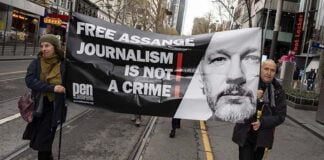Solidarity lists some more of the most damning leaks from the diplomatic cables released so far
US bombings covered up in Yemen
Yemen’s president Ali Abdullah Saleh admitted covering up for US airstrikes inside his country, pretending they had been carried out by the Yemeni military. “We continue saying the bombs are ours, not yours,” he reassured US General David Petraeus. Two cruise missile attacks in December 2009 killed 160 Yemeni civilians.
Israeli policy to cripple Gaza’s economy
Israeli officials openly admitted to US diplomats that the blockade of Gaza was designed to keep its economy on the brink of collapse. A November 2008 diplomatic cable revealed Israel wants Gaza’s economy to be “functioning at the lowest level possible consistent with avoiding a humanitarian crisis.” When the US offered $70 million in aid to Gaza, Israeli Major General Amos Gilad refused to allow it, saying the Palestinians should receive nothing.
Refugees
An unnamed “key Liberal Party strategist” told a US diplomat in November 2009 that the refugee issue was “fantastic” for them and, “the more boats that come the better”.
Helping US corporation Monsanto
The US embassy in Paris urged a trade war that “causes some pain across the EU” when France moved to ban a GM crop produced by US corporation Monsanto in 2007. US officials had earlier pressured the Pope’s advisers to rein in Catholic bishops in third world countries who opposed GM foods.
Helping Visa and MasterCard
The US lobbied Russia last year to change a draft law which would have deprived the US corporations of revenue. According to Russia’s finance ministry the law was “re-worked” to take into account the concerns of “foreign operators”. Is it any wonder Visa and MasterCard were so responsive to US government demands to ban donations to WikiLeaks?
US operations inside Pakistan
In 2008 Pakistan’s then Prime Minister Yousaf Raza Gillani personally approved US drone strikes inside Pakistan, commenting, “We’ll protest in the National Assembly and then ignore it.” In addition, small teams of elite US soldiers were operating inside Pakistan to help co-ordinate Pakistani military operations from 2009. They were involving in training as well as setting up live satellite feeds from US drone aircraft.
War crimes in Sri Lanka
The US ambassador to Sri Lanka admitted in a cable in January last year that it believed President Rajapakse guilty of war crimes committed during the war with the Tamil Tigers that ended in 2009. Yet it has refused to say this publicly or take any action against Sri Lanka.
Extraordinary rendition
The US embassy in Spain pressured politicians and judges to interfere in trials against US personnel over extraordinary rendition, the killing of a Spanish journalist in Iraq and the torture of Spanish citizens in Guantanamo Bay. The US forced Germany to drop plans to prosecute CIA officers who kidnapped an innocent German civilian, who was then detained for months in Afghanistan.
Corrupt US allies
Saudi Arabian’s King Abdullah proposed as a way to release Guantanamo detainees, “implanting detainees with an electronic chip containing information about them and allowing their movements to be tracked with Bluetooth. This was done with horses and falcons.”
Saudi Foreign Minister Prince Saud al-Faisal proposed the creation of an Arab force supported by US and NATO air power to fight Hezbollah in Lebanon.
- A good way to browse WikiLeaks’ US embassy cables is at this Wikipedia page, where they are listed by content including companies, region and countries




